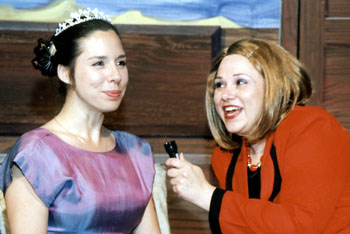![[Metroactive Stage]](/stage/gifs/stage468.gif)
[ Stage Index | Silicon Valley | Metroactive Home | Archives ]
Homegrown Royalty: Valerie Allen plays 'The Queen of America,' with help from Barbara Wabash.
'Art' and 'America'
Season-closers offer fresh perspectives on politics and culture
By Heather Zimmerman
AMERICANS have long been fascinated by other nations' royalty; with The Queen of America, playwright C.D. Payne gives us our own. In City Lights Theater Company's world premiere of this lighthearted political satire, Payne speculates on what might've happened if George Washington had crowned himself king. Seven generations later, when King George VII dies without an heir, Virginia Washington (Valerie Allen), a distant cousin found living in a Mississippi trailer park, ascends to the throne.
As one expects in a tale about royalty, Payne's play is plot-heavy, and not only in the sense of court conspiracies. But director Charlie Shoemaker melds Payne's episodic scenes into a fast-paced, engaging fantasy that breathes new life into the old fish-out-of-water conceit. Allen brings particular appeal to the plain-spoken, clever Virginia. Though Payne has created an amusing alternate world around the American monarchy--Elvis was knighted, Canada is the kingdom's mortal enemy--it's the similarities between fiction and reality that say the most about American culture and politics: public opinion in both worlds is the ultimate power, celebrity royals are pretty much the same as quasi-royal celebrities and, democracy or not, the idea of American ruling families seems quite familiar indeed.
While hypothetical history illuminates real-life politics, real arguments about theory prove equally enlightening in ART, an insightful comedy by Yasmina Reza that closes the season at San José Repertory Theatre. Serge's (Michael Butler) purchase of a pricey minimalist painting brings about an unexpected re-examination of his relationship with his two closest friends. Marc (Peter Van Norden) hates the painting, but always diplomatic Yvan (David Pichette) gives Serge a favorable opinion of the painting and Marc an unfavorable one. Yvan becomes caught in the middle as the antagonism mounts, until eventually, Serge and Marc can't agree to disagree about anything--although the lone point on which they do agree is that Yvan's agreement with everything is unforgivable.
The structure of ART is deceptively simple: a 90-minute argument, ostensibly about art, that features some hilarious asides during which the characters share their true feelings. As the argument becomes brutally personal, director Timothy Near keeps the laughs coming but the tensions ever-escalating until even violence seems a possibility.
Butler, Van Norden and Pichette play off each other beautifully, their characters goading each other in ways only the best of friends could. The brilliance of ART is that Reza never champions one view over the other but proves their interdependence--none can define his opinion without the presence of the others'. Ultimately, it's the friendship of the three men, and not their theories on art and culture (or lack thereof), that ART celebrates. If Reza makes any assertions about art at all, it is to suggest that what each one of us sees in a work of art extends far beyond what's painted on a canvas or acted on a stage. And maybe that's the beauty of art, and ART.
[ Silicon Valley | Metroactive Home | Archives ]
Copyright © Metro Publishing Inc. Metroactive is affiliated with the Boulevards Network.
For more information about the San Jose/Silicon Valley area, visit sanjose.com.
![]()

Photograph by Dave Lepori
The Queen of America plays Thursday-Saturday at 8pm, Sunday at 7pm through June 15 at City Lights Theater, 529 S. Second St., San Jose. Tickets are $15-$22. (408.295.4200).
ART plays Tuesday-Friday at 8pm, Saturday at 3 and 8pm, and Sunday at 2 and 7pm through June 16. Tickets are $20-$44. (408.367.7255)
Send a letter to the editor about this story
.
From the May 23-29, 2002 issue of Metro, Silicon Valley's Weekly Newspaper.